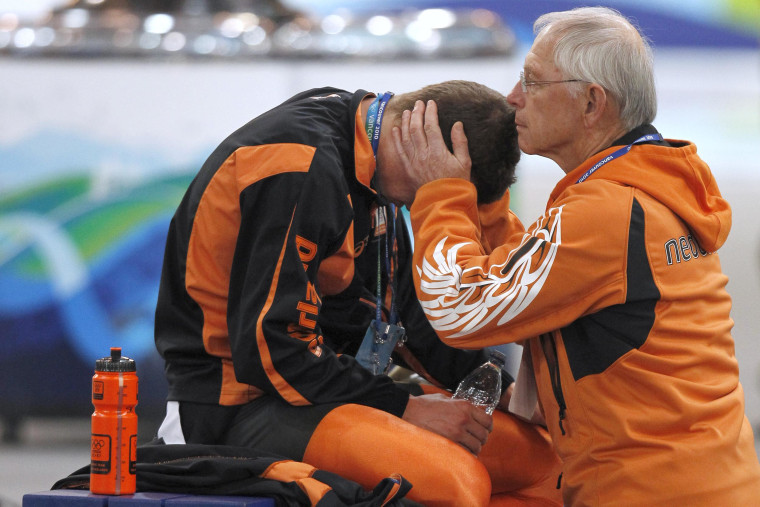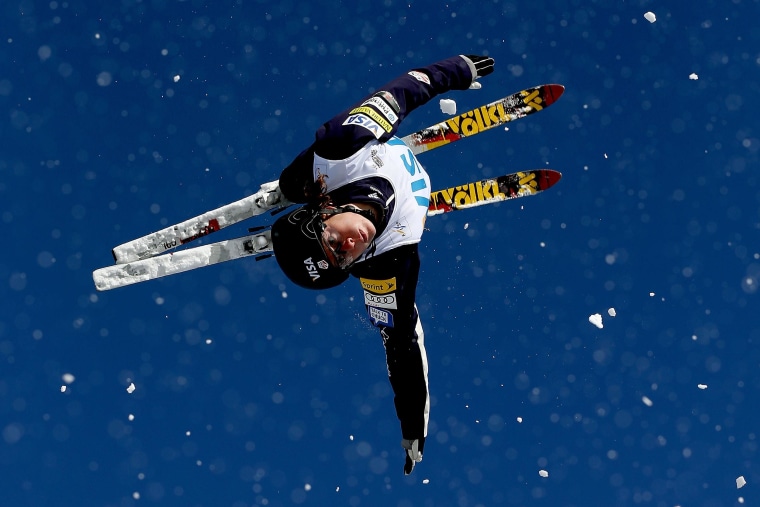You know the mind trick where someone says to you, Don't think about elephants? And the harder you try to resist it, all you can think about is, of course — elephants.
Some sports psychologists who work with Olympic athletes say that's a pretty appropriate analogy to describe both the old way of motivating athletes — Don't think, even for a minute, about losing! — and the reason it often didn't work. Because within the last decade, some experts say that there's been a sea change in the way they work with prospective Olympians. Instead of keeping athletes' eyes laser-focused on WIN-WIN-WIN and GOLD-GOLD-GOLD, they're now preparing them to withstand a variety of outcomes — even the possibility of defeat.
“When athletes prepare, they want to win, obviously," says Peter Haberl, a senior sports psychologist for the United States Olympic Committee. "But it’s almost unavoidable for thoughts to come up, like, ‘What if I don’t win?’
"So, for the longest time, the approach was — don't have those thoughts. Now, the research shows the more you're trying not to have the thought, the more likely the thought will appear at the most inappropriate time," says Haberl, who has worked with Olympians for more than 15 years, and says he started to see this shift around 2007.
Over the last two and a half decades, psychological research has demonstrated the zombie-like effect of thought suppression: We try with all our mental might to kill an unwanted thought, and back it comes, undead and more powerful than ever. Smokers who try not to think about smoking, for example, end up having more intense cravings than smokers who didn't try to suppress thoughts of smoking. And studies have shown that highly emotional thoughts — like, oh, the fear of failing to medal at your last-ever Olympic Games — are perhaps the most stubborn.

The funny thing is that this infinite thought suppression loop is actually your brain's attempt at helping, according to research by Harvard psychologist Daniel Wegner. Our minds try to chase away an unwanted thought, so one part of our brain hunts around for any hint of the banned content. But this hall patrol process actually ends up keeps the thought around — if part of your brain is watching out for thoughts about losing, part of your brain is, essentially, thinking about losing.
So instead of suppressing thoughts and fears of Olympic defeat, many sports psychologists now encourage their athletes to let the thought in. Acknowledge it. And then let it go. If that sounds like something a yoga teacher might say, it's no accident. Part of this trend is to incorporate mindfulness practices — to notice the fear, but then come right back into the present, says Lauren Loberg, a sports psychologist who is in Sochi working with the U.S. Ski and Snowboard team.
“With Alpine, it’s these gorgeous amazing venues all over the world,” says Loberg. She says that she tells her athletes, when their inner Debbie Downer pipes up, to "take a second and look out at the scenery — look out at the vista. Just remember — what an opportunity. How cool is this, that I get to do this today?"
“What’s so bad about failure? I mean, what’s the worst case scenario? What if you don’t get the medal?"
Nicole Detling, a sports psychologist who is in Sochi working with U.S. aerial skiiers, says she'll sometimes have her athletes follow their "What if?!" thoughts of defeat to their logical endings.
“What’s so bad about failure? I mean, what’s the worst case scenario? What if you don’t get the medal? What’s going to happen then? Sometimes I have the athletes go through that," Detling says.
Before Sochi, aerial skier Emily Cook went through this odd imagination exercise under Detling's guidance: Cook envisioned the way each of her friends and family members would react if she came away from her last Olympic Games empty-handed — no gold, silver or bronze medal. She wrote a short paragraph imagining each of her loved ones’ reactions. And she discovered something that surprised her: Deep down, she knew they’d all be fine with it. Their love, their relationships, wouldn’t change if her results were disappointing.
Because Olympians are under an enormous amount of pressure — many feel the gold medal dreams of their family, their town, their entire country.
“Athletes have this sense that they’ll let everyone down — with the Olympic games, it’s,‘I’m going to let the country down.’ But in the end, that’s an illusion of the mind,” Haberl says. "I don’t remember a single incident where an athlete didn’t do well at the Games where the headline was, 'Nation In Mourning.' Or the flags were at half-mast.
"That’s something I tell athletes, because then, when I burst that bubble of illusion, it’s easier to go for it, rather than to hold back and worry about something that could go wrong,” says Haberl, who most recently worked with the Summer Olympics water polo team.
One of the first steps to harness the idea of failure before it becomes all-consuming is to define what "failure" means for the individual athlete.
“Within the Olympic culture, not medaling is failure,” Detling says. “When they find out someone’s an Olympian the first question is, 'Did you medal?’"

In December, Paralympic skier Caitlin Sarubbi had to rework her own definition of success and failure during four major qualifiying events for the 2014 Paralympic Games. During a training run right before the first race, Sarubbi crashed, suffered a concussion and wasn't able to compete in those qualifiers.
"When you build something up so much in your mind, and you feel so confident and ready to perform well, it is hard when you don’t get the chance because of an injury," said Sarubbi, who is blind and skis with her sister, who is her guide.
Detling, who does not work with Sarubbi, encourages her athletes to be mindful of all of their accomplishments, even the smallest ones.
“But what did you achieve? I tell them to look for those small victories, those small successes along the way,” Detling says. “Those can be just as important for an individual. It’s not as important for our culture, unfortunately.”
For Sarubbi, a conversation with her parents helped her identify those accomplishments.
"My parents understood my frustration and knew how hard I worked to get there, but their main goal, and my goal as well, was to heal and get better," Sarubbi said. "For them, a successful race is that we are safe and did the best we could, and not about how well we finished."
Detling often uses the John Candy quote from "Cool Runnings" to motivate her athletes: “If you’re not enough without the medal, you’ll never be enough with the medal."
“At the end of the day, a medal is a chunk of metal,” Detling says. “You are not a different person with or without a metal. Who are you? What do you bring to the world? That’s not going to change.”
TODAY.com reporter Vidya Rao contributed to this report.
